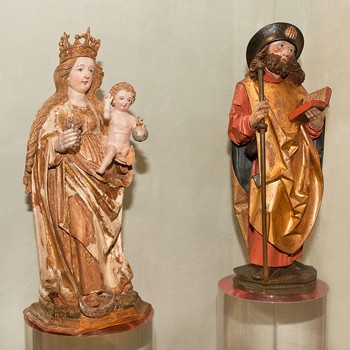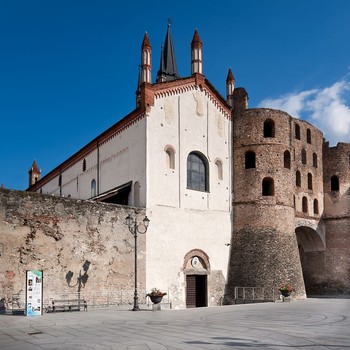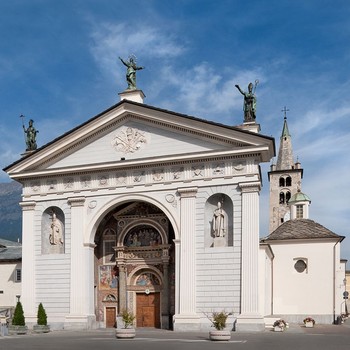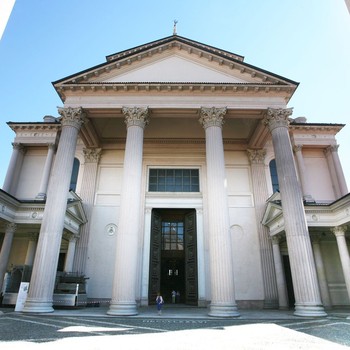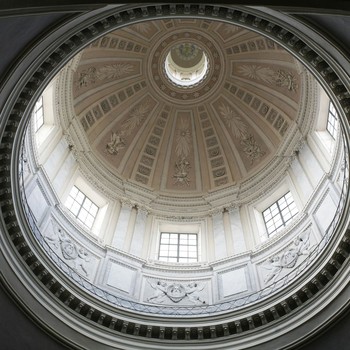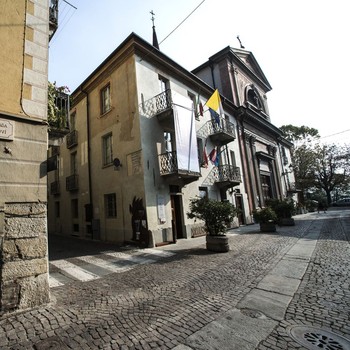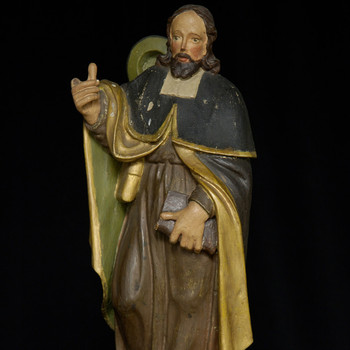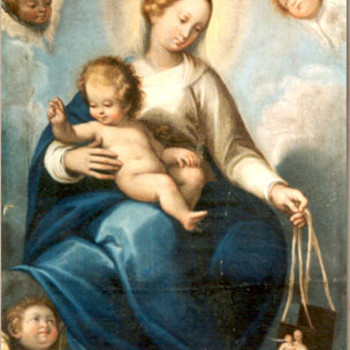Aosta Cathedral Treasury Museum
Diocesi di Aosta
Aosta Cathedral Treasury Museum shows a significant selection of Valle d’Aosta’s sacred art heritage.
Cathedral of Maria Vergine Assunta
Diocesi di Saluzzo ( sec. XV )
Santa Maria was elevated from a pieve to a collegiate church in 1483, then to cathedral in 1511. It houses the famous polyptych by Hans Clemer, commissioned for the high altar by the Marquises Ludovico II and Margaret of Foix-Candale.
Cathedral of San Giusto
Diocesi di Susa ( sec. XI )
Cathedral of San Giusto, Diocese of Susa. Founded in 1027, it was a monastery until 1749, when it became a collegiate church, and then a cathedral in 1772. The building is in Romanesque style, with a Latin cross plan.
Cathedral of San Pietro
Diocesi di Alessandria ( sec. XIII; XIX )
The cathedral of San Pietro, in the diocese of Alessandria, is a 19th-century building that replaced an earlier Romanesque church, dating from the 13th century and demolished by order of Napoleon Bonaparte.
Cathedral of Sant'Evasio
Diocesi di Casale Monferrato ( sec. XII; XVIII; XIX )
The current cathedral of Sant’Evasio, with a nave and four aisles, is the result of rebuilding in the style of the second half of the 18th century, while the majestic narthex has preserved its original medieval characteristics.
Cathedral of Santa Maria Assunta
Diocesi di Aosta ( sec. IV; XI; XIX )
Founded at the end of the 4th century, Aosta Cathedral was rebuilt seven centuries later. It was further modified by major refurbishments in the 15th–16th and 19th centuries.
Cathedral of Santa Maria Assunta
Diocesi di Novara ( sec. IV; XX )
Novara Cathedral is a complex building, whose 19th-century structure designed by Alessandro Antonelli features details from the Early Christian and Romanesque periods, while the interior houses a wealth of artworks.
Cathedral of Sant’Eusebio
Diocesi di Vercelli ( sec. XII; XVI; XIX )
Founded in ancient times, the cathedral was rebuilt from 1570 onwards, by order of Cardinal Ferrero. The latest restoration work was completed in 2012, under Archbishop Enrico Masseroni.
Cuneo San Sebastiano Diocesan Museum
Diocesi di Cuneo-Fossano
The museum is located in the picturesque old town of Contrada Mondovì. The museum itinerary is arranged on five levels and starts from the ancient church dedicated to Saint James, then moves on to the room dedicated to Saint Sebastian.
Diocesan Museum System
Diocesi di Susa
Diocesan Museum System. Constituted by the network of ecclesiastic museums coordinated by the Diocesan Museum of Sacred Art of Susa, which collect together and display the religious artistic heritage of the Susa Valley.
Diocesan Museum of Tortona
Diocesi di Tortona
The Palazzo del Seminario in Tortona houses the Diocesan Cultural Centre, comprising the Historical Archive, the Seminary Library and the Diocesan Museum (currently still under restoration).
Upper Maira Valley Museum of Sacred Art
Diocesi di Saluzzo ( sec. XVIII )
The Upper Maira Valley Museum of Sacred Art is housed in the Santissima confraternity and dates back to 1998. It is home to Acceglio’s important Cappuccini picture gallery, with a selection of local works that risked being lost.
Ancient Crucifixes
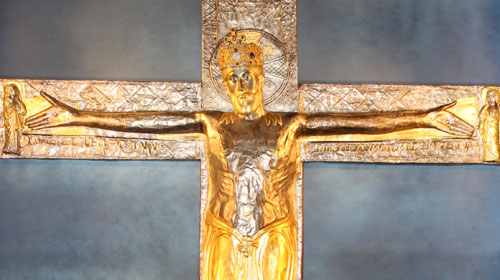
Of course the crucifix theme is recurrent in the history of art and over the centuries. One of the most important crucifixes of Western art of all time is found in Piedmont, kept in Vercelli Cathedral Treasury and dating back to the year 1000.
The wooden cross was commissioned by Bishop Leone and features overlapping embossed silver foil decorated with gold, enamel and precious stones. It is an expression of Ottonian art, which is better known for its illuminated manuscripts. The size (327 x 236 cm) and artistic quality of the opus make it a true rarity, while it is similar in type to a crucifix found in Casale Cathedral, taken from Alessandria Cathedral in 1403 by the condottiero Facino Cane.



